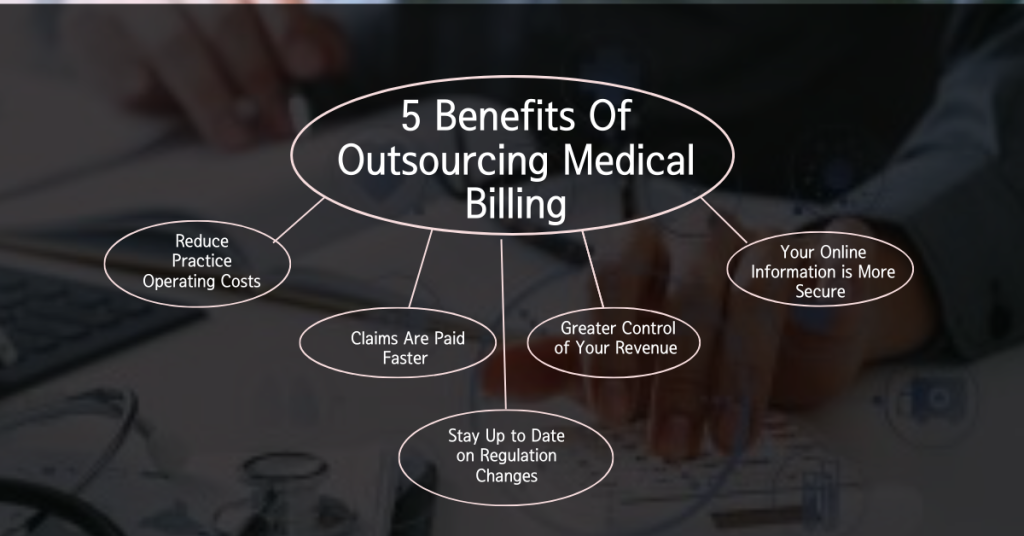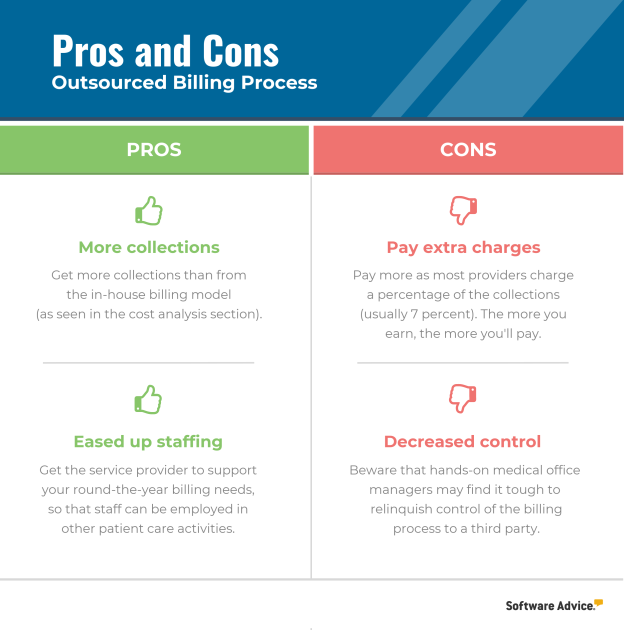As a healthcare professional running your own medical practice, you are constantly faced with the challenge of ensuring efficient, accurate, and timely billing for your services. With the ever-changing landscape of medical billing regulations and the increasing complexity of insurance claims, it can be overwhelming to handle these tasks in-house. This article explores the crucial question of whether outsourcing medical billing for your practice is a wise choice, examining the benefits, considerations, and potential drawbacks of such a decision. By delving into this topic, you will gain a comprehensive understanding of whether outsourcing medical billing is the right solution for your practice’s financial success.
Advantages of Outsourcing Medical Billing

This image is property of bellmedex.com.
Cost Reduction
Outsourcing medical billing can offer significant cost savings for medical practices. By partnering with a third-party billing company, you can eliminate the costs associated with hiring and training an in-house billing staff. Additionally, outsourcing eliminates the need to invest in expensive billing software and infrastructure. The costs of maintaining and upgrading these systems are taken care of by the billing company.
Efficiency and Accuracy
Outsourcing medical billing allows for increased efficiency and accuracy in the billing process. Professional billing companies specialize in medical billing and have extensive experience and expertise in coding, claim submission, and revenue cycle management. They are up-to-date with industry regulations and can ensure that your claims are correctly coded and submitted in a timely manner. This can result in faster reimbursements and minimize the chances of claim denials.
Expertise and Experience
Medical billing companies hire skilled professionals who have in-depth knowledge of the healthcare billing industry. They are well-trained in medical coding, billing software, and regulations. By outsourcing your medical billing, you gain access to their expertise and benefit from their experience. This can help your practice navigate complex billing rules and regulations, reducing the risk of non-compliance and potential financial penalties.
Focus on Patient Care
Outsourcing medical billing allows you and your staff to focus on providing quality patient care without the added burden of managing billing operations. By offloading the time-consuming and complex task of medical billing, you can allocate more resources and attention to patient care. This can result in improved patient satisfaction and outcomes, ultimately benefiting your practice.
Disadvantages of Outsourcing Medical Billing

Loss of Control
One of the main disadvantages of outsourcing medical billing is the potential loss of control over the billing process. When you outsource, you are entrusting a third-party company to handle a critical aspect of your practice’s financial management. This means you may have limited visibility and control over the billing operations. It is essential to establish clear communication channels and regular reporting to ensure transparency and maintain control over the billing process.
Potential Communication Issues
Outsourcing medical billing may involve working with a team that is located in a different geographic location or time zone. This can lead to potential communication challenges, such as language barriers or delays in response times. It is crucial to choose a billing company that prioritizes effective communication and offers prompt support to address any concerns or questions that may arise.
Security Concerns
Due to the sensitive nature of patient data and the potential for breaches in the healthcare industry, security concerns are a significant disadvantage of outsourcing medical billing. When you outsource, you are entrusting a third-party company with confidential patient information. It is crucial to thoroughly vet the security protocols and measures in place at the billing company to ensure data protection and compliance with HIPAA regulations.
Factors to Consider Before Outsourcing
Size and Complexity of Practice
The size and complexity of your medical practice play a significant role in determining whether outsourcing medical billing is the right choice for you. Larger practices with a high volume of claims may benefit more from outsourcing, as it allows for scalability and expertise in managing large volumes of billing transactions. Smaller practices with less complex billing needs may find it more cost-effective to handle billing in-house.
Budget and Cost Analysis
Before deciding to outsource medical billing, it is crucial to conduct a thorough cost analysis. Calculate the costs associated with in-house billing, including salaries, benefits, software, hardware, and maintenance expenses. Compare these costs to the fees charged by a medical billing company to determine potential cost savings. Consider the return on investment (ROI) and evaluate whether the benefits of outsourcing outweigh the financial implications.
In-house Billing Team
Assess the capabilities and efficiency of your in-house billing team, if you have one. Determine whether they have the necessary expertise, experience, and resources to handle the billing workload effectively. If your team is struggling with productivity, experiencing frequent claim denials, or lacking in knowledge of the latest industry regulations, outsourcing may be a viable solution.
Technology and Infrastructure
Evaluate your current billing software and infrastructure to determine if it meets your practice’s needs. If your systems are outdated or insufficient for efficient billing operations, outsourcing may provide access to advanced technology and infrastructure without the need for additional investments. Consider the compatibility of your existing systems with the billing company’s software to ensure seamless integration.
Compliance and Legal Considerations
Compliance with healthcare regulations, such as HIPAA, is of utmost importance in the medical billing process. Ensure the billing company you choose has strict compliance protocols in place and follows industry best practices. Review their data security measures, employee training, and auditing processes to ensure they prioritize compliance and protect patient information.
Choosing the Right Medical Billing Company

Industry Reputation and Experience
When selecting a medical billing company, it is essential to consider their reputation and experience in the industry. Look for companies with a proven track record of success, positive customer reviews, and references from other healthcare providers. An experienced billing company will have a deep understanding of the unique challenges of medical billing and will be able to provide valuable insights and guidance.
Service Offerings
Evaluate the range of services offered by the billing company to ensure they align with your practice’s specific needs. Consider whether they handle all aspects of medical billing, including coding, claim submission, denial management, and revenue cycle management. Additionally, inquire about any additional services such as patient billing inquiries or reporting capabilities that may be beneficial to your practice.
Pricing Structure
Carefully review the pricing structure of the billing company to ensure it aligns with your budget and financial goals. Some companies charge a percentage of the collected revenue, while others have a flat fee or a combination of both. Consider the services included in the pricing and any additional fees for software, support, or other add-ons. It is crucial to have a clear understanding of the financial implications before entering into a contract.
Customer Support
The availability and quality of customer support provided by the billing company are crucial factors to consider. Determine their response time to inquiries and the channels through which support is offered (phone, email, or online chat). Ideally, choose a company that offers 24/7 support, as billing issues can arise at any time. Good customer support ensures that any concerns or questions are addressed promptly, minimizing disruption to your practice’s operations.
Data Security Measures
Data security is a top concern when outsourcing medical billing. Inquire about the billing company’s data security protocols and measures. Ensure they follow industry standards for data encryption, secure data centers, access controls, and regular monitoring. Request information on their disaster recovery plans to ensure the safety and availability of your practice’s data in the event of a breach or system failure.
Transitioning from In-house to Outsourced Billing

Evaluation and Documentation
Before transitioning from in-house to outsourced billing, conduct a thorough evaluation of your current billing processes. Document all relevant information, including software systems, billing workflows, and employee responsibilities. This documentation will serve as a reference during the transition and ensure a smooth handover to the billing company.
Training and Communication
Effective training and communication are key to a successful transition. Ensure that your staff is properly trained on the new billing processes and software. Establish open lines of communication with the billing company to address any questions or concerns during the implementation phase. Regular communication will help identify and resolve any issues that may arise, ensuring a seamless transition.
Implementation and Testing
Work closely with the billing company to implement their systems and processes within your practice. Test the integration between your systems and theirs, ensuring the accuracy and reliability of data transfer. Conduct thorough testing of all billing functionalities to identify and resolve any potential issues. The billing company should provide support and guidance throughout the implementation process.
Monitor and Adjust
After the transition to outsourced billing, closely monitor the performance and efficiency of the billing company. Regularly review reports and measure key performance indicators to ensure they are meeting your expectations. Address any concerns or areas for improvement with the billing company and make adjustments as needed. Ongoing monitoring and communication will help maintain the quality of billing operations and ensure a successful partnership.
The Importance of Data Security

HIPAA Compliance
Data security is critical in the healthcare industry, and compliance with the Health Insurance Portability and Accountability Act (HIPAA) is essential. When outsourcing medical billing, ensure that the billing company has robust HIPAA compliance measures in place. They should have policies and procedures that safeguard patient information, train their employees on HIPAA regulations, and conduct regular audits to ensure ongoing compliance.
Encryption and Secure Data Centers
Encryption is a fundamental security measure when it comes to protecting patient data. The billing company should employ encryption technologies to secure data during transit and storage. They should also have secure data centers with advanced security measures, such as firewalls and intrusion detection systems, to prevent unauthorized access to sensitive information.
Access Control Measures
Controlling access to patient data is crucial to maintaining its security. The billing company should have strict access control measures in place, allowing only authorized personnel to access patient information. This includes unique user credentials, multi-factor authentication, and role-based access controls. Regular access reviews and audits should be conducted to ensure compliance and identify any unauthorized access attempts.
Audit Trails and Monitoring
To ensure data integrity and detect any potential security breaches, the billing company should maintain comprehensive audit trails and conduct regular monitoring. Audit trails track all actions performed on patient data, providing a detailed record of who accessed the information and when. Ongoing monitoring helps identify any suspicious activities, allowing for prompt action to mitigate potential risks.
ROI and Cost Analysis

This image is property of prsrevenuesolutions.com.
Comparison of In-house vs. Outsourced Billing
To determine the ROI of outsourcing medical billing, conduct a comprehensive comparison of the costs and benefits of in-house versus outsourced billing. Consider the costs associated with in-house billing, such as salaries, benefits, software, hardware, maintenance, and training. Compare these costs to the fees charged by the billing company. Factor in the potential benefits of improved efficiency, reduced claim denials, and faster reimbursements to evaluate the overall financial impact.
Evaluation of Cost Savings
Calculate the potential cost savings by outsourcing medical billing. Consider the decrease in staffing costs, savings on software and infrastructure expenses, and the reduction in claim denials. Factor in the reduction in time spent on billing-related tasks, allowing your staff to focus on revenue-generating activities. By evaluating the cost savings, you can determine the financial advantage of outsourcing.
Revenue Growth Potential
Outsourcing medical billing can also help enhance revenue growth potential. Skilled medical billing companies can identify missed revenue opportunities, optimize coding and billing practices, and provide insights for improving the revenue cycle. By leveraging their expertise, you can maximize revenue generation and accelerate cash flow, ultimately leading to increased profitability for your practice.
Allocation of Resources
Outsourcing medical billing allows for the efficient allocation of resources within your practice. By offloading the billing responsibilities, you can redirect staff and financial resources towards core functions, such as patient care, marketing, and strategic planning. This reallocation of resources can lead to improved operational efficiency and better utilization of your practice’s capabilities.
Importance of Communication and Collaboration

Regular Updates and Reporting
Establishing regular updates and reporting with the billing company is crucial for maintaining transparency and effective communication. Agree on a reporting schedule that suits your practice’s needs, including key performance indicators, financial reports, and claim status updates. Regular updates will provide insights into the billing process, allowing you to address any issues or concerns promptly.
Aligning Goals and Objectives
Effective communication and collaboration require aligning goals and objectives between your practice and the billing company. Clearly communicate your practice’s expectations, desired outcomes, and performance targets. Ensure that the billing company understands your practice’s unique needs and works towards achieving those goals. Regularly reassess and discuss goals to ensure ongoing alignment and success.
Collaboration with Healthcare Providers
Collaborating with healthcare providers is essential for successful outsourced billing. Establish open lines of communication with referring physicians, specialists, and other healthcare providers within your network. Ensure that the billing company has the necessary information to accurately process claims, such as coding guidelines and referral documentation. Effective collaboration will result in smoother claim processing and revenue cycle management.
Risks and Challenges of Outsourcing Medical Billing

This image is property of www.allzonems.com.
Dependency on External Service Provider
Outsourcing medical billing creates a dependency on an external service provider. Your practice becomes reliant on their ability to effectively manage billing operations and meet performance expectations. To mitigate this risk, choose a reputable and reliable billing company with a proven track record. Establish clear contractual terms and service level agreements (SLAs) to ensure accountability and performance standards.
Potential Quality and Accountability Issues
When you outsource medical billing, there is always a risk of potential quality and accountability issues. The billing company may make errors in coding, claim submission, or revenue cycle management that can negatively impact your practice’s finances and reputation. To mitigate this risk, carefully review the contractual terms and SLAs to ensure the billing company is held accountable for any mistakes and has mechanisms in place for addressing issues promptly.
Transition Challenges
The transition from in-house to outsourced billing can present challenges. It may take time for the billing company to fully understand your practice’s unique processes, systems, and requirements. Technical integration and data transfer can also be complex tasks that require careful planning and execution. To minimize the impact of the transition, ensure thorough evaluation, documentation, training, and ongoing communication with the billing company.
Best Practices for Successful Outsourced Billing

Clear Contract Terms and SLAs
When entering into a partnership with a billing company, it is crucial to establish clear contract terms and service level agreements (SLAs). The contract should outline the scope of services, performance expectations, and responsibilities of each party. SLAs should define measurable performance metrics, such as claim submission timeliness and denial rates, to ensure accountability and enforceable standards.
Ongoing Performance Monitoring
Regularly monitoring the performance of the billing company is essential for maintaining quality and identifying areas for improvement. Track key performance indicators (KPIs) such as claim acceptance rates, reimbursement rates, and revenue cycle metrics. Review reports and compare them to agreed-upon benchmarks to assess performance. Constant monitoring allows for prompt action if performance falls below expectations.
Continued Communication and Feedback
Maintaining open lines of communication and providing feedback is vital for a successful outsourcing partnership. Schedule regular meetings or conference calls with the billing company to address any concerns or questions. Share feedback on areas for improvement and acknowledge positive performance. This ongoing communication will help foster a collaborative relationship and ensure that both parties are working towards the same goals.
In conclusion, outsourcing medical billing offers several advantages for medical practices, including cost reduction, increased efficiency and accuracy, access to expertise and experience, and the ability to focus on patient care. However, there are also disadvantages to consider, such as the loss of control, potential communication issues, and security concerns. Before outsourcing, factors such as the size and complexity of the practice, budget analysis, in-house billing team capabilities, technology and infrastructure, and compliance and legal considerations should be evaluated. Choosing the right medical billing company requires assessing their industry reputation and experience, service offerings, pricing structure, customer support, and data security measures. Transitioning from in-house to outsourced billing involves evaluation and documentation, training and communication, implementation and testing, and ongoing monitoring and adjustment. Data security, ROI and cost analysis, communication and collaboration, as well as risks and challenges associated with outsourcing, should be taken into account. Best practices for successful outsourced billing include clear contract terms and SLAs, ongoing performance monitoring, and continued communication and feedback. By carefully considering these factors and following best practices, medical practices can make an informed decision regarding the outsourcing of their medical billing processes.
